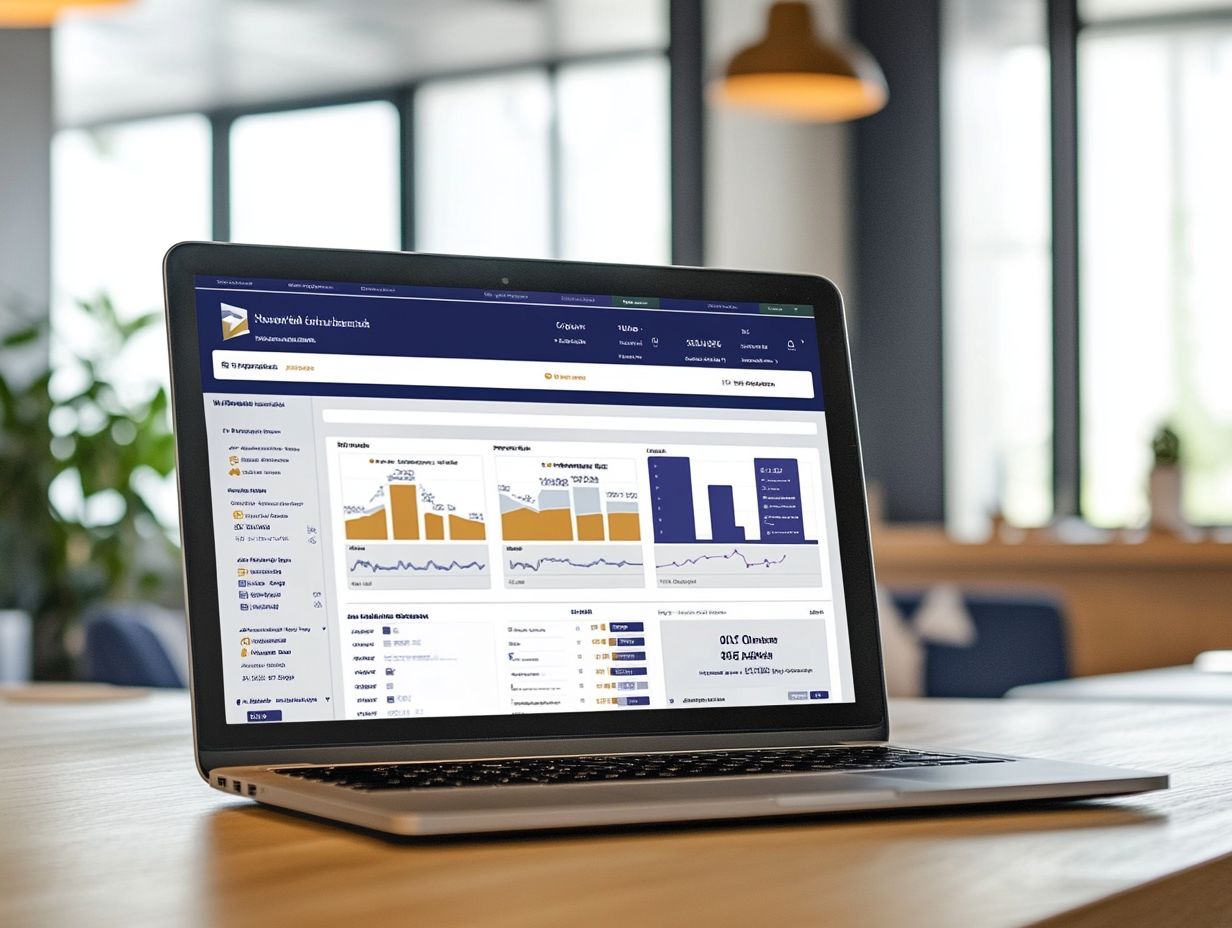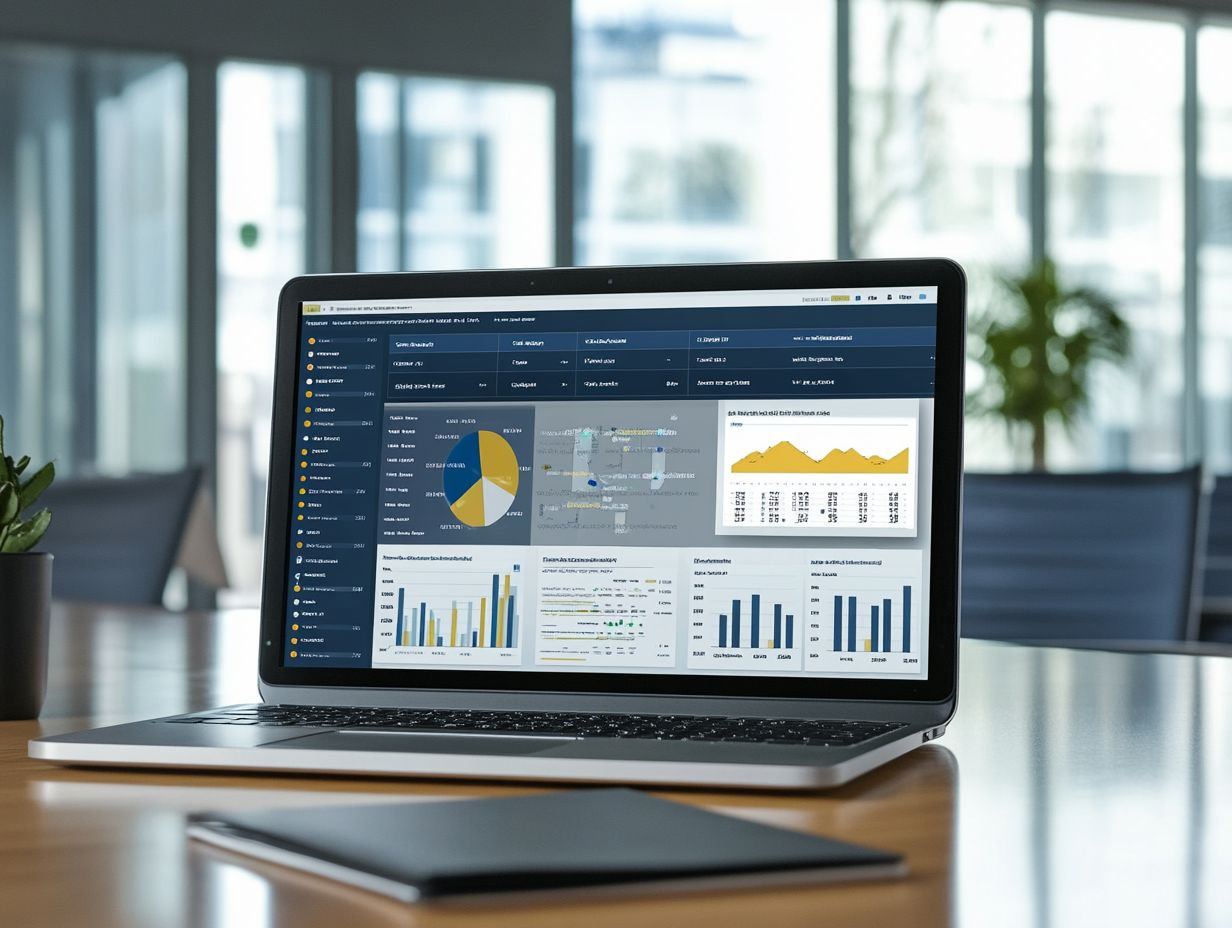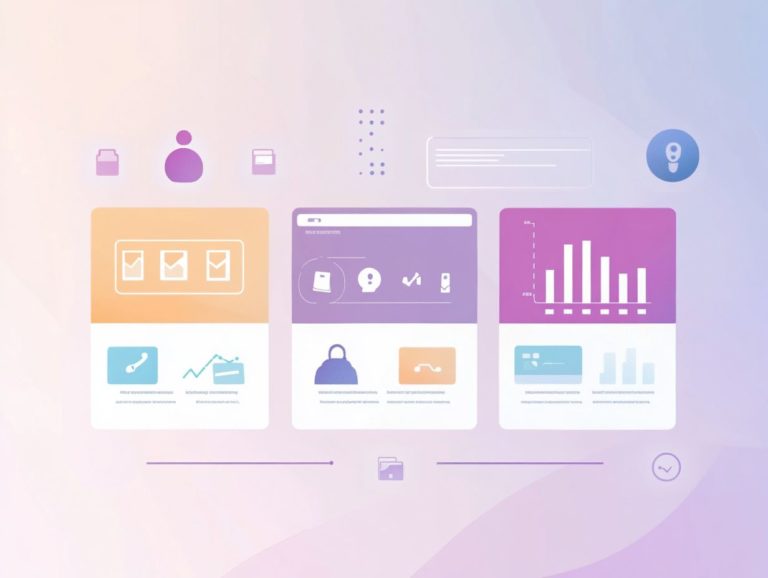What is CRM Software?
In today s fast-paced business environment, mastering customer relationship management (CRM) is essential for your success.
CRM software streamlines interactions with clients. It enhances productivity through automation. This article unpacks what CRM software is and its purpose, exploring key features that range from customer data management to sales and marketing automation.
The article also explores the numerous benefits of CRM.
You ll find guidance on selecting the perfect CRM solution for your needs, along with best practices for seamless implementation. Discover how CRM can revolutionize your business and supercharge your operations today!
Contents
Key Takeaways:

- CRM software helps manage customer data effectively.
- It automates sales and marketing processes.
- Implementing CRM can improve customer relationships and lead to business growth.
Understanding CRM Software
Grasping the details of CRM software is crucial for businesses looking to elevate their customer relationship management strategies. To understand how this powerful digital solution will evolve, it’s helpful to explore the future of CRM software, as it centralizes customer data and streamlines various business processes.
It offers sales teams invaluable insights into consumer behavior, significantly enhancing overall sales productivity.
With the flexibility to choose between cloud-based and on-premise CRM options, you can tailor your approach to align with your unique business needs. This ensures robust data security and a user-friendly interface that fosters effective collaboration among your team.
Definition and Purpose
CRM software, or tools that help manage customer interactions, is crafted to enable you to manage and analyze customer interactions throughout the entire customer lifecycle.
By centralizing your customer data, these tools provide your sales teams with a comprehensive view of their clients. This paves the way for personalized communication and targeted marketing efforts. Every interaction becomes informed and relevant, significantly enhancing the customer experience.
Moreover, CRM software streamlines your processes by automating routine tasks. This allows your team to concentrate on building stronger relationships and closing more deals.
In essence, it equips you with the essential tools to nurture leads and maintain customer loyalty, ultimately driving both revenue and growth.
Key Features and Functions
Key features and functions of CRM software encompass comprehensive customer data management, streamlined sales automation, and a sophisticated reporting dashboard designed to elevate your overall sales performance.
Customer Data Management
Customer data management is an essential aspect of CRM software. It allows you to gather, store, and analyze customer insights that inform your sales forecasting.
By effectively organizing customer information, you can pinpoint trends, preferences, and buying behaviors that ultimately enhance your sales strategies.
This structured approach not only streamlines communication and engagement with potential buyers but also enables your team to make data-driven decisions that boost productivity.
In a landscape where data privacy threats are ever-increasing, it’s crucial not to overlook robust security measures in this management process. Protecting sensitive customer data fosters trust and supports compliance with regulations, enabling you to harness valuable insights while safeguarding your reputation in a competitive market.
Sales and Marketing Automation

Imagine boosting your sales productivity overnight CRM software makes it possible. Sales and marketing automation features in CRM software greatly improve how efficiently you work by handling repetitive tasks and identifying marketing qualified leads through advanced analytics.
This level of automation lightens the manual workload for your teams, allowing them to concentrate on strategic initiatives. It also streamlines your lead management process.
With powerful tools like HubSpot, Salesforce, and Zoho at your disposal, you can effortlessly integrate sales triggers alerts that notify your team about potential sales opportunities based on user behavior and engagement.
By leveraging these capabilities, your teams enjoy improved collaboration. Sales representatives can access valuable insights to effectively engage with prospects.
The end result? A noticeable boost in sales productivity, as automation cultivates a more responsive and agile operational environment.
Customer Support and Service
CRM software changes how you handle customer support and service, enhancing team collaboration and fostering customer loyalty by keeping track of what your team is doing.
This powerful tool streamlines communication channels, ensuring that every team member has access to the same customer data, enabling knowledge-based decision-making.
By efficiently managing support tickets, you can prioritize urgent issues and resolve them more quickly.
Tracking customer interactions helps your support teams analyze patterns and preferences, ultimately elevating service delivery to meet individual needs.
As a result, your organization gains invaluable insights to continuously refine its offerings, making the customer experience remarkably seamless.
Benefits of Using CRM Software
Using CRM software opens the door to many benefits that can change your business. Experience enhanced customer relationships, increased efficiency, and improved sales performance across various sectors.
Embracing this technology enables you to streamline processes and build meaningful connections with your clients. Discover how these benefits can take your operations to the next level!
Improved Customer Relationships
CRM software plays a crucial role in strengthening your customer relationships by providing a structured platform for managing customer data and insights. This technology helps you tailor your communication strategies, ensuring that every interaction is relevant and meaningful.
By analyzing customer preferences and behaviors, you can identify the unique needs of your clientele, allowing for personalized recommendations and offerings. Such targeted engagement nurtures loyalty, making customers feel valued and understood.
Effective CRM solutions facilitate seamless communication across various channels, significantly enhancing the overall customer experience. These tools streamline your processes and help you build stronger relationships with your customers.
Increased Efficiency and Productivity
One of the primary benefits of CRM software is its remarkable ability to elevate efficiency and productivity within your sales team through task automation and a comprehensive reporting dashboard.
By streamlining repetitive tasks such as data entry, follow-up reminders, and customer segmentation, CRM systems enable you to focus on what truly matters: building relationships and closing deals.
Imagine automation features sending personalized emails at scheduled intervals to nurture leads effortlessly, freeing you from manual intervention.
With powerful data analytics tools at your fingertips, you gain valuable insights into customer behavior, track sales performance, and spot trends that inform your strategic decision-making.
This not only enhances your workflow but also fosters collaboration among team members, ensuring everyone remains aligned and informed.
Choosing the Right CRM Software

Selecting the ideal CRM software is essential for your business. It requires careful consideration of several key factors, including customization options, the total cost of ownership, and integration capabilities.
Taking the time to assess these elements enables you to make a choice that aligns perfectly with your operational needs and long-term goals.
Factors to Consider
When selecting CRM software, several key factors demand your attention, such as implementation costs, easy connection to other tools, and the capacity for sales automation. It s essential to explore the broader implications of your choices.
Scalability is crucial. You want a solution that can grow with your evolving needs without necessitating a complete overhaul. User experience is important; intuitive navigation ensures your teams can adapt seamlessly, leading to higher adoption rates and increased productivity.
Don t overlook the importance of effective customer support. Having reliable assistance ensures that any technical issues can be swiftly resolved, maintaining smooth operations and user satisfaction.
Adopting this comprehensive approach to evaluating CRM software can dramatically boost your overall business performance.
Implementing CRM Software
To implement CRM software effectively, adhere to best practices that facilitate a seamless setup, encourage team collaboration, and utilize customization options to unlock the software s full potential.
By doing so, you position yourself to enhance productivity and drive success within your organization.
Best Practices and Tips
Adopting best practices when utilizing CRM software can truly elevate your team’s collaboration, customer support, and overall sales performance.
To maximize these benefits, it s essential for your organization to implement regular updates to the CRM system, ensuring that the information remains current and relevant.
Proper user training is vital. When your team members know how to navigate the software effectively, they can unlock its full potential to track customer interactions and streamline workflows.
Establishing feedback mechanisms enables users to share their experiences and suggest improvements, fostering a culture of continuous enhancement.
Start focusing on these key areas today! By doing so, you not only optimize CRM usage but also cultivate a more cohesive approach to client management.
Frequently Asked Questions
Explore the following frequently asked questions to learn more about CRM software and its benefits:
What is CRM Software?

CRM stands for Customer Relationship Management. To better understand this concept, it’s helpful to explore what mobile CRM software is, as it is a technology that helps businesses manage their interactions and relationships with current and potential customers.
What are the key features of CRM software?
Some common features of CRM software include contact management, sales pipeline tracking, lead management, customer data analysis, and task management. Other features may include marketing automation, customer service management, and social media integration.
How does CRM software benefit businesses?
CRM software can help businesses improve customer satisfaction, increase efficiency and productivity, enhance sales and marketing efforts, and make data-driven decisions. It also helps in building stronger customer relationships and increasing customer retention.
Is CRM software only for large businesses?
No, CRM software can be used by businesses of any size. There are CRM solutions available for small, medium, and large businesses, with varying features and pricing options. Small businesses can also benefit from using CRM software to manage their customer relationships and improve sales and marketing efforts.
How can CRM software be implemented in a business?
CRM software can be implemented through either cloud-based or on-premise solutions. Cloud-based CRM can be accessed through a web browser, while on-premise CRM requires installation on a local server. Businesses can choose the option that best fits their needs and budget.
Is CRM software secure?
Yes, most CRM software comes with security measures such as data encryption, user access controls, and regular backups to ensure the safety of customer data. However, it is important for businesses to choose a reputable CRM provider and follow best practices to protect sensitive information.
In conclusion, investing in the right CRM software can transform your customer management processes. Start exploring your options today!






